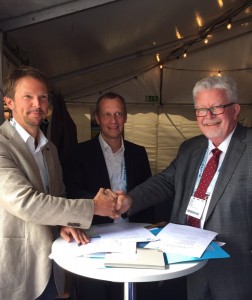Collaborating with GIZ on urban water risk management solutions in Africa
Stockholm, August, 2015 — GIZ through its International Water Stewardship Programme (IWaSP) signed an agreement with 2030 WRG to collaborate on raising awareness and convening stakeholders to identify urban water risk-management solutions in Kenya and elsewhere. The collaboration will start with a joint multi-stakeholder effort to improve the water balance in the Nairobi catchment.
Urban water management is a growing challenge for many of the world’s fast growing developing cities. Cities in Kenya are no exception. In particular, in the capital Nairobi, a combination of decreasing ground water levels, flooding, degradation of the catchment area, and uncontrolled waste disposal together risk jeopardizing the sustainability of the city’s expansion, as well as creating major water issues for user downstream. This is a challenge not just for governments, but also for the private sector and society at large. Private companies in Kenya for instance are increasingly recognizing that availability and quality of water is a potentially substantial risk, and are seeking ways and means to address that risk.
Anders Berntell, 2030 WRG Executive Director said: “Solving these complex and intertwined challenges can therefore benefit substantially from collective action and new partnerships. In response, 2030 WRG has recently launched the Kenya 2030 WRG partnership which will drive collaboration and action amongst stakeholders on priority issues such as urban water management.”
One key partner in this endeavor is GIZ, who have already taken an active role in raising awareness and convening stakeholders to identify urban water risk-management solutions in Kenya and elsewhere. “The International Water Stewardship Programme improves water security for people and companies. This can only be achieved by cooperative effort of civil society, private and public sector organisations. In collaborating with 2030 WRG, IWaSP aims to move water risks in Nairobi up on the agenda. With the results of the joint assessment we hope to lay a firm basis for mobilizing many actors to identify sustainable joint solutions,” said André Lammerding, programme manager of IWaSP.
About IWaSP
IWaSP is implemented by the Deutsche Gesellschaft für Internationale Zusammenarbeit (GIZ) GmbH, on behalf of the German Federal Ministry for Economic Cooperation and Development (BMZ) and the UK Department for International Development (DFID). IWaSP enables public sector, private sector and civil society actors to reach consensus on water risks and solutions, and partner to implement joint action plans. Currently IWaSP supports twelve partnerships in 7 countries with more than over 50 partners, improving ecosystem protection, water supply access, infrastructure investment and water governance.

